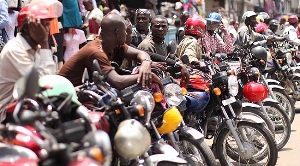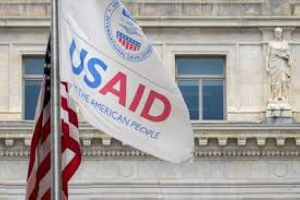Part I
By Dr. Michael J.K. Bokor
E-mail: mjbokor@yahoo.com
July 15, 2010
The stench of bribery and corruption is in the air, flowing all the way from Seoul, South Korea, to compound what is already disturbing Ghanaians at home. No one can miss it. News reports of a glaring instance of misconduct by our politicians and public office holders on official government business are disturbing:
“The former Minister of Water Resources, Works and Housing, Albert Abongo, has denied media reports that a 12-member government delegation that endorsed the STX Korea housing deal on behalf of the country in 2009 were bribed with US$2,600 by the Korean company” (MyJoyOnline, 7/15/10).
We refuse to accept this denial. It is the usual brash display of shameless bravado in the face of what is obviously unacceptable by all standards of morality. Albert Abongo cannot fool us.
This occurrence once again re-echoes the careless abandon with which public office holders indulge in imprudent acts that make a mockery of any official pronouncement that the fight against bribery and corruption is on course. It portrays the depth of moral decadence that pervades office-holding and is a true reflection of our government’s inability to stem that vice. Let me say it again that public office-holding in Ghana breeds corruption that our leaders cannot prevent because they are themselves corrupt and don’t have the moral strength or political determination to fight it. Funds for their political parties often come from this vicious cycle of bribery and corruption. They benefit from it; they know it; and they must bow their heads in shame!
Now, let’s consider the full implications of this case concerning the STX Korean deal. Abongo is indeed shamelessly audacious and insulting enough to have openly admitted that the Ghanaian delegation took gifts (cameras, wrist watches, souvenirs of the company, etc., but not money as is being alleged): “He revealed that what they took were only gifts and not bribes to induce them.” Again, “Mr. Albert Abongo said members of the delegation merely received gifts from the Korean company which cannot be termed as inducement.”
I shudder at this open display of irresponsible behaviour. Is Abongo giving us his own definition and interpretation of “bribery and corruption”? Does he want to tell us that to him, bribery and corruption involve only money-giving-and-taking? Or that without the monetary element, there is no offence committed? What does he mean by INDUCEMENT, anyway? It has only one meaning: “something that motivates or persuades.” Bribery and corruption—in all their shades, hues, and colorations—have only one objective, which is encapsulated by the word “inducement” (meaning, using the gift to influence the psychology and physical actions of the recipient for either a stated or an unstated purpose).
Thus, by taking those gifts from the Korean business people with whom the government was negotiating a business deal, what were Abongo and the others laying themselves open to? Not to be influenced (INDUCED) by those “motivational or persuasive gestures” for a specific purpose, which is to have a good impression of the Korean company and to establish goodwill for it before the government and people of Ghana? And considering the zeal with which the government side has tackled this STX Korean deal so far—despite the obvious flaws in the agreement, which opponents resisted and condemned—won’t we be right to conclude that the favourable impression that the Korean gift-givers expected had, after all, been achieved for them by the government delegation? And who represented them? Not Abongo and his team?
With this desperate twist to his perception of bribery and corruption, Abongo is being deliberately mischievous. Before the delegation landed in Korea, did its members have their own cameras with which to take pictures? If they didn’t and the Koreans saw that lack as a means to influence them by giving them cameras, shouldn’t we say that the gift was being used as a bait to induce them? And they fell for it!! To the gift-givers, the trap had snapped a big catch—the Ghana government’s favourable response to their request.
Abongo is palpably wrong. He and the other members of the government delegation accepted those gifts, got influenced in their opinions, and paltered. What those gifts can do, money can also do. Any gift (whether tangible or intangible) given to any person who has the responsibility to determine the fate of the giver constitutes a bribe, and is an offence. These public office holders were not to receive gifts, especially knowing very well that they were yet to handle the issue concerning the Korean givers. If the gifts were given after the determination of the case, the transaction might have a different interpretation. But not in this case. Let’s face it.
Gift-giving and-taking is regarded as a likely source of undue influence. The Service Orders of the Ghana Police Service, for instance, explicitly enjoin any Police officer who receives a gift (from any member of the public) to inform the IGP about it and to forward such a gift to the IGP. This provision aims at discouraging gift-giving-and-taking involving such security personnel. But it hasn’t stemmed the vice. As to why the IGP is not enjoined to do same (report to a higher authority and account for any gift he receives), I don’t know. And he receives gifts too. It is part of the intricate network.
Abongo’s open utterances are a clear admission of committing impropriety and action must be taken to punish the members of that delegation or the one led by the Minority Leader, Kyei Mensah-Bonsu, if its members also received gifts, which can be seen as nothing but INDUCEMENTS to act in favour of the company. And the impudence with which Abongo sought to defend that impropriety is nauseating!
Complaints from the public are already reaching the sky. Will President Mills do anything to assuage doubts and fears? Or, as happened in the Muntaka case, will officialdom again be equivocal in responding to bribery and corruption? Will President Mills for once act decisively to restore hope in Ghanaians that public office holding is not an avenue for all manner of vices as we have seen over the years?
The return to power of the NDC seems to be confirming our fears that bribery and corruption cannot be eradicated from public office. It will remain the cause of our doom. The deplorable conduct in office of government functionaries, Ministers/Deputy Ministers of State, and public office holders demonstrates clearly that we cannot change our attitudes to tackle bribery and corruption decisively. It will continue to exist and prevent us from changing our circumstances for the better.
More alarmingly, the unsatisfactory approach toward tackling the vice by the Atta Mills government (with all the hindsight from the public anger at corruption in previous governments behind it) confirms that the situation will not change soon for the better. By appointing people with questionable characters as Ambassadors and retaining in positions of trust others fingered for their involvement in corrupt deals, President Mills has confirmed fears that just like his predecessors, he cannot lead us fight corruption. It is disquieting.
To be continued…
Opinions of Sunday, 18 July 2010
Columnist: Bokor, Michael J. K.














